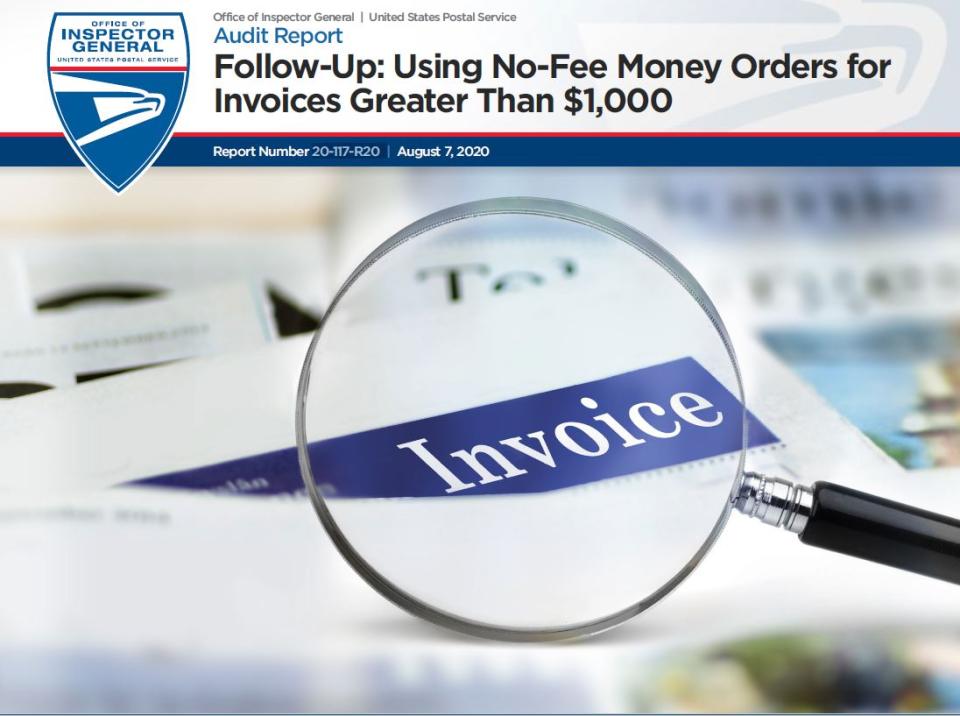Follow-Up: Using No-Fee Money Orders for Invoices Greater Than $1,000
Objective
In fiscal year (FY) 2019, we audited nine local Postal Service units in eight different districts that addressed issues related to local purchases and payments. One of the issues we tested was exceeding the $1,000 invoice limit by using multiple no-fee money orders for local purchases and payments. These reports resulted in 11 recommendations to district management to reiterate policies and procedures, train applicable employees, and provide tax reportable documentation to vendors receiving payments. District management agreed to these recommendations and took corrective action.
Our objective for this report was to evaluate whether corrective actions taken by the Postal Service, in response to those reports, sufficiently addressed the issue of exceeding the $1,000 invoice limit by using multiple no-fee money orders for local purchases and payments.
We issued our reports in FY 2019 before the President of the United States issued the national emergency declaration concerning the novel coronavirus disease (COVID19) outbreak on March 13, 2020. Our analysis was nearly complete before the outbreak and does not reflect operational changes and/or service impacts that may have occurred as a result of the pandemic.
Finding
Eight of nine units we audited for local purchases and payments in FY 2019 used multiple no-fee money orders to pay invoices greater than $1,000. These eight units previously audited in FY 2019 were no longer exceeding the $1,000 invoice limit by using multiple no-fee money orders for local purchases and payments in FY 2020. However, of the four local purchases and payment audits in our FY 2020 Financial Controls audits, we found two new retail units in the Northeast Area and one new retail unit in the Western Area that had similar issues. All three units exceeded the $1,000 invoice limit by using multiple no-fee money orders, and the two Northeast Area retail units were not completing the necessary documents to report tax payments to the IRS. We addressed these issues directly with the local units and applicable districts.
To estimate the scale of this issue nationally, we analyzed no-fee money orders issued in FY 2019 and the first half of FY 2020.
- For FY 2019, we identified 60 units had issued two or more no-fee money orders on the same day that, in total, exceeded $1,000. Payments using the no-fee money orders totaled $178,000.
- For the period of October 1, 2019, through March 31, 2020, we identified 18 units that had issued two or more no-fee money orders on the same date that, in total, exceeded $1,000. Payments using the no-fee money orders totaled $55,000.
The data did not detail to whom these payments were made. However, although we cannot definitively know without visiting each retail unit individually, it is likely that these units exceeded the $1,000 invoice limit by using multiple no-fee money orders to pay for local purchases, similar to those issues identified during our FY 2019 and FY 2020 audits.
When post office employees do not ensure purchases and payments are properly processed, the Postal Service risks issuing incorrect or unauthorized payments. In addition, when tax reportable payments to vendors are not reported as required, the Postal Service could be violating federal law and be assessed penalties.
Recommendation
We recommended management reiterate to area, district, and field personnel that local purchases and payments using no-fee money orders for an emergency, one-time expense, are limited to invoices for $1,000 or less and, if no-fee money orders are used, services must be reported, using appropriate documentation, to the IRS.

